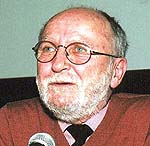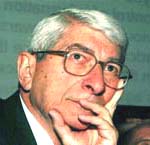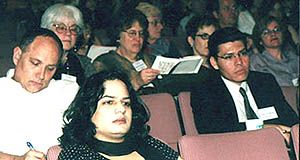| home |
| agenda |
| speakers |
| abstracts and papers |
| contact |
| comparative media studies |
| communications forum |
| MIT |
|
MiT3: television in transition Plenary
Conversation 3:
|
||||
|
James
Carey, Columbia Univ. An audiorecording of News During Wartime is now available.
BERNARD KALB
began with a reminiscence about Vietnam (in which he served as a
field correspondent), noting that it was hard to believe, at the
time, that the B-52's then bombing the country around him were the
same ones shown on television. Vietnam became a recurring point
of comparison during the session; Bernard commented that the brevity
of the Iraq war made mass disillusionment impossible, allowing all
sides in the debates over the war to remain where they began, namely
with their foregone conclusions. He also linked coverage of the
Vietnam war to coverage of the first Gulf war, contrasting the "ignorance"
of journalists' coverage of those actions - both conflicts took
place in worlds about which Americans have traditionally been expected
to know precious little - with the second Persian Gulf war in which
journalists had "no excuse" for their ignorance of Middle
Eastern culture and politics.
JAMES CAREY spoke about the national character of the world's major TV systems: whether commercial or state-supported, they often bear the names of their countries of origin. Marvin Kalb would point to the same fact moments later, but for Carey this was a problematic notion: "there is no Archimedean point in the universe from which these events can be seen objectively," he noted, but he was clear not to excuse incomplete coverage on the basis of that fact. Speaking of Al-Jazeera, he pointed out that, had the Iraqis won the war, Al-Jazeera would have certainly focused on that military victory, rather than on civilian casualties (which have received much coverage in the international press but little in the mainstream U.S. media). He then pointed to Seymour Hersh's story in the New Yorker about the forgery of documents linking Saddam Hussein to terrorism, which received minimal attention in other American news outlets. There is plenty wrong with U.S. journalism in a variety of media, he said, extending the problem beyond the sensationalizing tendencies of TV.
MARVIN KALB opened with the claim the word "bias" is over-used and "plays to an ill-informed audience." After all, he said, "When a nation goes to war, its journalists go to war, too." He stressed that claims of deliberate bias are overblown; the bombing of Baghdad was filmed from a single faraway spot not because of the desire to minimize the representation of Iraqi casualties, he said, but because that was the only vantage point granted to reporters by the Iraqi regime. He went on to say that the press does not withhold footage of civilian casualties and gruesome death out of any desire to blackout coverage, or because the audience is unwilling to see such images. It is simply the case that the audience - the American TV news audience, specifically - does not demand them. Discussion The first questioner mentioned a CNN reporter allegedly claimed that the network specifically ordered him not to show images of civilian casualties. The Kalbs doubted this claim. Bernard said that he'd "done interviews with more than twenty embedded journalists; not a single one even suggested that at any time the military stopped them from doing anything." Marvin called for specificity: one station, CNN, actively made this choice at an editorial level. But did all stations make the same choice for the same reasons? Carey said the issue was a recurring one in American journalism. The closer people get to the dead, the more upsetting it is, which is why the New York Times received complaints about their photos of people leaping from the burning World Trade Center, on the grounds that it invaded the privacy of the dead. The bodies of the unknown and faraway are less upsetting, of course - Iraqi casualties are easier to stomach - but "when the lights go up" in newsrooms (indicating viewer objections), it's often on the exposure of a body in an "inappropriate" situation. Another audience member drew the link between news and marketing: it's not a matter of sensitivities; it's about whether the news broadcast will help advertisers sell hemorrhoid medication. The next questioner
asked: could the U.S. media do more to enhance the freedom of people
everywhere with less biased, more objective coverage? The questioner
spoke as well of lack of context, which everyone in the audience
would agree was a problem. Bernard agreed that more context was
called for, but claimed that such context is available to the U.S.
TV audience; in contrast, Carey remarked that (for instance) pro-Israel
bias results from, among other things, "the relative absence
of indigenous Palestinian voices in the U.S."
The next set of questions pertained to embedded journalists. Asked to give their "report cards" on the performance of this new breed of wartime coverage, each speaker gave a different view of the matter. Marvin Kalb quickly responded: "I give embedded journalism an A-." From the standpoint of journalists and the Pentagon, he said, it was a "terrifically successful experiment." For every embedded reporter, he reminded the audience, at least one non-embedded "unilateral" was present in the theater of war, and the "totality" of that coverage yielded good results. Carey was more dubious; he claimed that GI's don't like having to protect journalists, and that this close relationship makes objective journalism impossible in any case. And had the war gone on for a year, Carey argued, we have no idea what coverage would have been like. Bernard Kalb responded to Carey's claims about GI/reporter antipathy by pointing out that his experience has been quite different: soldiers tend to see reporters as an outlet. "I've spoken to no one at the Pentagon, so I can speak with great authority," he joked. How do you rebuild trust between the Pentagon and the press corps in the wake of Vietnam and the press blackout in Afghanistan? Provide "total" access. We saw this most recent war through a microscope rather than binoculars - trading breadth of coverage for unparalleled detail and access. A question about the camera's point of view - an old concept for film studies - provoked a strong reaction from the Brothers Kalb: given that the camera can make us feel for its subject regardless of our moral stance, hasn't the U.S. government's action in Iraq worked just that way, to establish inherent sympathy for the American soldiers? The ensuing exchange got defensive ("the reporter isn't a robot!"), but the basic point came across from the Kalbs that TV coverage isn't the only coverage available, and that other modes of representation somehow allowed for more complete coverage. Though a questioner
repeatedly tried to get the Kalbs to concede that embedded journalism
had to be more pro-U.S. than freelance work, they were adamant about
the success of the program. In response
to a series of comments from the audience about the jingoistic quality
of American news coverage, Carey emphasized "complexity"
of the journalist's situation: "You can't maintain opposition
to an interventionist government policy unless the opposition party
stands with you," he said. "Where's the Democratic Party?"
he asked. The conversation then shifted to coverage of the looting in Baghdad. Bernard said fairly simply that the story was overplayed, but that thankfully "we've seen reality shrink the story." "But it doesn't change it," Carey replied, calling the story a missed opportunity for "real learning" about a culture with a wholly different notion of antiquity from that of the U.S. The influence of Rupert Murdoch's global media empire was mentioned by several in the audience, particularly in light of the perceived right-wing bias of the reporting on the Fox TV network, a Murdoch holding. Carey downplayed his importance - citing Fox's "small ratings," a notion the audience seemed to doubt - but noted that the exporting of the Fox News Empire worldwide was a cause for heightened concern. Marvin Kalb said that Fox has politicized news coverage by giving the impression of supporting the administration, of being a Republican organ - thereby making everything else appear to be on the Left. "That's nonsense," he said, "but nonsense that's spreading." The final question came from conference co-organizer William Uricchio, who asked whether the gross lack of knowledge on the part of the general viewing public - 51% of whom were said to believe that Saddam Hussein was directly responsible for 9/11 - was mere ignorance, or willful misinformation, or indicative of how journalism really works? Bernard responded with "all of the above," but Carey repeated his pragmatic call for "organized political force" working to combat this misinformation and misuse of the power of media.
|



